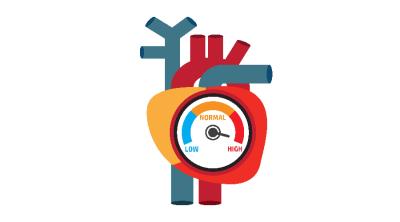
Hypertension (High Blood Pressure)
It's normal for blood pressure to go up and down throughout the day. But if it stays up, you have high blood pressure. Another name for high blood pressure is hypertension. For diagnosis, the top number may be 130 to 140 or higher. The bottom number may be 80 to 90 or higher. Despite what a lot of people think, high blood pressure usually doesn't cause headaches or make you feel dizzy or lightheaded. It usually has no symptoms. But it does increase your risk of stroke, heart attack, and other problems. You and your doctor will talk about your risks of these problems based on your blood pressure. Your doctor will give you a goal for your blood pressure. Your goal will be based on your health and your age. Lifestyle changes, such as eating healthy and being active, are always important to help lower blood pressure. You might also take medicine to reach your blood pressure goal.
Follow-up care is a key part of your treatment and safety: Be sure to make and go to all appointments, and call your doctor if you are having problems. It's also a good idea to know your test results and keep a list of the medicines you take.
Caring For Yourself At Home:
-
Monitor Blood Pressure: Regularly check your blood pressure using a home blood pressure monitor. Keep track of your readings and share them with your healthcare provider.
-
Healthy Diet: Opt for a balanced diet rich in fruits, vegetables, whole grains, lean proteins, and low-fat dairy. Reduce sodium (salt) intake to help lower blood pressure.
-
Exercise Regularly: Engage in moderate aerobic exercises like walking, swimming, or cycling for at least 150 minutes per week, as recommended by your doctor.
-
Maintain a Healthy Weight: Aim for a healthy body weight through a combination of diet and exercise. Losing excess weight can significantly improve blood pressure.
-
Limit Alcohol: If you drink, do so in moderation. Men should limit to no more than two drinks per day, and women to one drink per day.
-
Quit Smoking: Smoking raises blood pressure and damages blood vessels. Seek support to quit smoking if needed. Work with your healthcare provider.
-
Reduce Stress: Practice relaxation techniques like deep breathing, meditation, or yoga to manage stress, as it can impact blood pressure.
-
Medication: If prescribed by your doctor, take your medication as directed. Don't stop or adjust doses without consulting your healthcare provider.
-
Regular Check-ups: Schedule regular follow-up appointments with your doctor to monitor your blood pressure and overall health.
-
Lifestyle Modifications: Work with your healthcare provider to create a customized plan that suits your needs, addressing diet, exercise, and stress management.
Remember, hypertension is manageable with consistent efforts and medical guidance. Always consult your healthcare provider before making significant changes to your lifestyle or medication.
This guide is not a substitute for professional medical advice. Always consult a healthcare professional for accurate diagnosis and treatment or any other medical concern.
In an emergency, please call 911 immediately!
